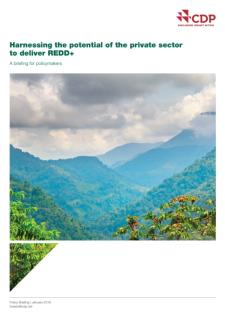
Partnership between the public and private sectors can offer advantages to all stakeholders in REDD+, providing finance, technology and project skills. Private sector companies may play various roles in REDD+, but there must be a business case for them to do so.
The main challenge to private sector participation in REDD+ is that most companies do not see sufficient business benefit. For those which do identify an opportunity, there are then further risks which include legal uncertainty around emissions rights, land tenure and the respective roles of national and subnational government.
National governments take different approaches to administering REDD+, both in terms of their approach to market incentives and in relation to the delegation of administrative powers to subnational level, and as a result private sector companies have different levels of participation. Brazil and Colombia act as helpful case studies to illustrate these differences.
Based on engagement and experience with both the private and public sector, this report provides three recommendations for policy measures:
- Create conditions under which the private sector can identify and benefit from opportunities related to REDD+;
- Create legal certainty around REDD+ intervention parameters in order to reduce risk and increase value; and
- Empower and resource subnational jurisdictions to effectively develop and implement REDD+ interventions.
